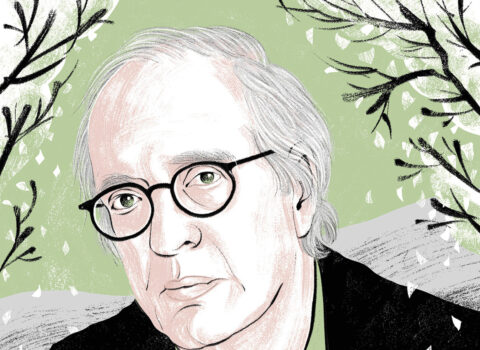John Updike gave us a great many ways to be grateful. He embraced forms (novel, story, poem, essay, play) polyamorously, and then within each of these offered variations aplenty. His facility, to writers, was, depending on their temperaments, a source of envy, awe, or annoyance. I’ve heard many young poets through the years complain loudly about Updike’s uptake of the scanty column inches allotted to poetry in The New Yorker and elsewhere, as though it wasn’t his right to plant his feet iambically where he chose. That he did feel well at ease to do as he pleased provided those who enjoyed his verses the obvious pleasure of them, but it also offered friction: as much as writers were inspired by him, his example also provided a way for the young writer to define herself against him. The recent vogue for starry-eyed “mentoring” elides the no less necessary, perhaps more needed, role played by the king’s statue in the town square: something to tilt at, taunt, topple.
Knocking Updike, though, as David Foster Wallace lovingly and famously did, is easy, because toppling Updike was made impossible by Updike. Wallace might have made him teeter upon his plinth, but he did not crumble; there’s simply too much very fine writing to deny him his place at a table to which few of his contemporaries could feel themselves worthy of an invitation, much less a place. Picked-up Pieces was the first of Updike’s books to leave an uncomplicated mark on me. I read this collection of essays on literature in college at a time where postmodernism was the rage. Updike’s appraisals of books I happened to be reading at the time (Nabokov, big surprise) reoriented me as to how how the practice of reading was, in the academy, being queered by an approach that, whatever its merits, ultimately had little to say to me about why I was reading to begin with. Whereas Updike’s writerly sympathies were readerly. Updike wrote about writing as reading in the way David Gates, in his beautiful Jernigan, defines the practice: it was “not just going along with the words but thinking about things at the same time.”
As someone who writes for a living about books, I’ve always been astonished by Updike’s capacities as a critic. In conversation on this topic, young critics (those who take tea with the young poets mentioned above) have often questioned the sincerity of my appreciation of Updike’s literary essays. They always seem quick to say “Oh yeah, great stuff. Who could disagree with his appraisal of Fear of Flying as a ‘loveable, delicious novel….’” Martin Amis, a great admirer of Updike’s, mind, has an essay in this mode that takes the dismissive tone and at least makes an argument out of it. “Kind to stragglers and also-rans, to well-meaning duds and worthies, and correspondingly cautious in his praise of acknowledged stars and masters, Updike’s view of twentieth-century literature is a leveling one.” Yes and no. Certainly there are examples of Updike’s grading on a generous curve. But here’s the thing: if you sat down and wrote 5,000 pages of book reviews in your lifetime—well over a million words, for that’s the tally in Updike’s case—I’m pretty sure there’d be a conspicuous failing or two.
Far more conspicuous, it seems to me, is Updike’s successes in that form. His reviews were generous, but not in the sense that he regularly mollycoddled mediocrity. He tried to take at books on the terms they set for themselves, then tried to evaluate how well they managed on those terms, then looked at whether those terms were themselves adequate, useful, or beautiful. This habit of mind alone is unusual in the practice of long form literary criticism, which in lesser hands attached to meaner minds devolves into a sport of knaves. “What can one say, critically, about a critic without seeming hypercritical?” asked Updike in his assessment of Cyril Connolly. Of Updike the critic I can say: he will be missed.





